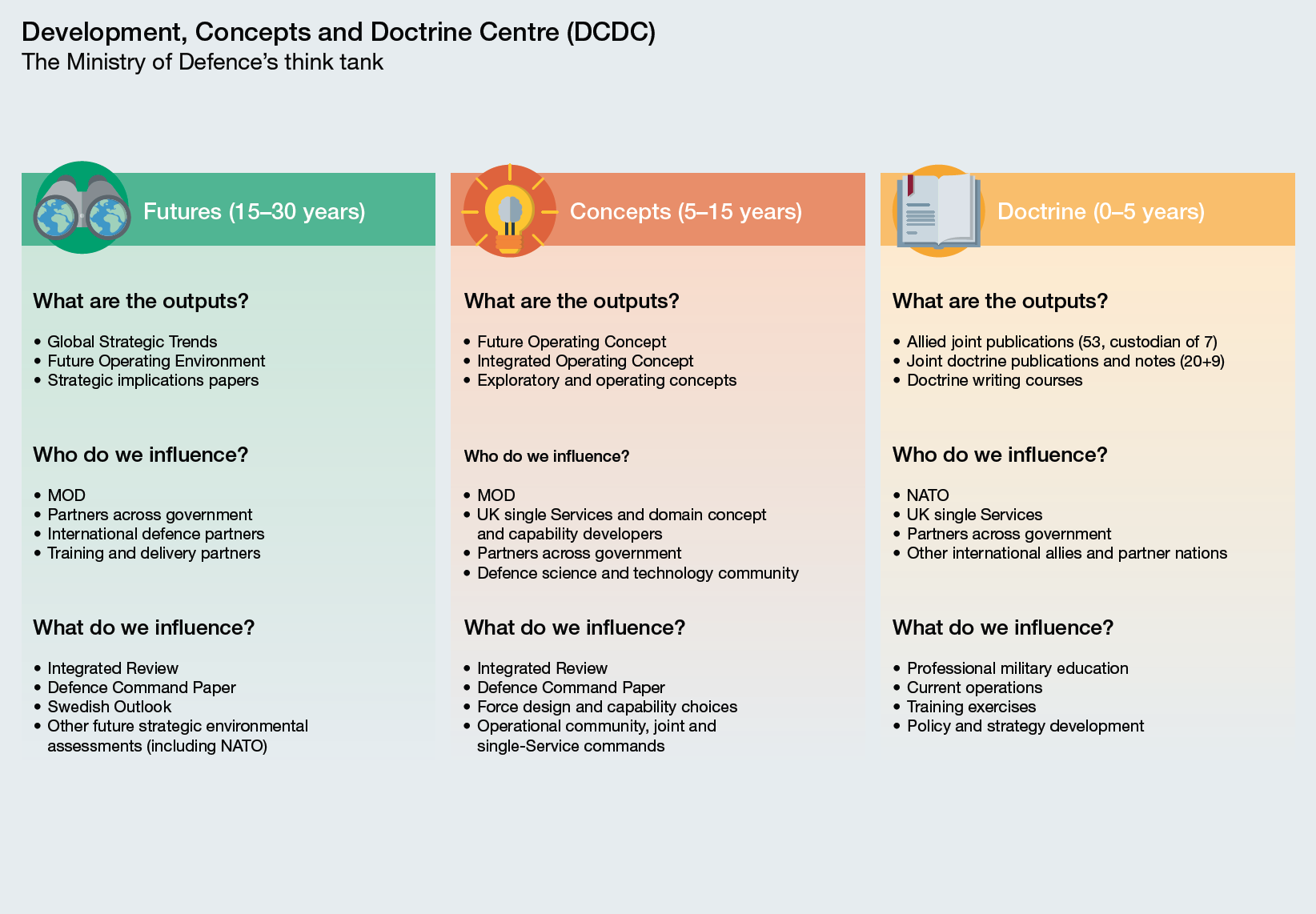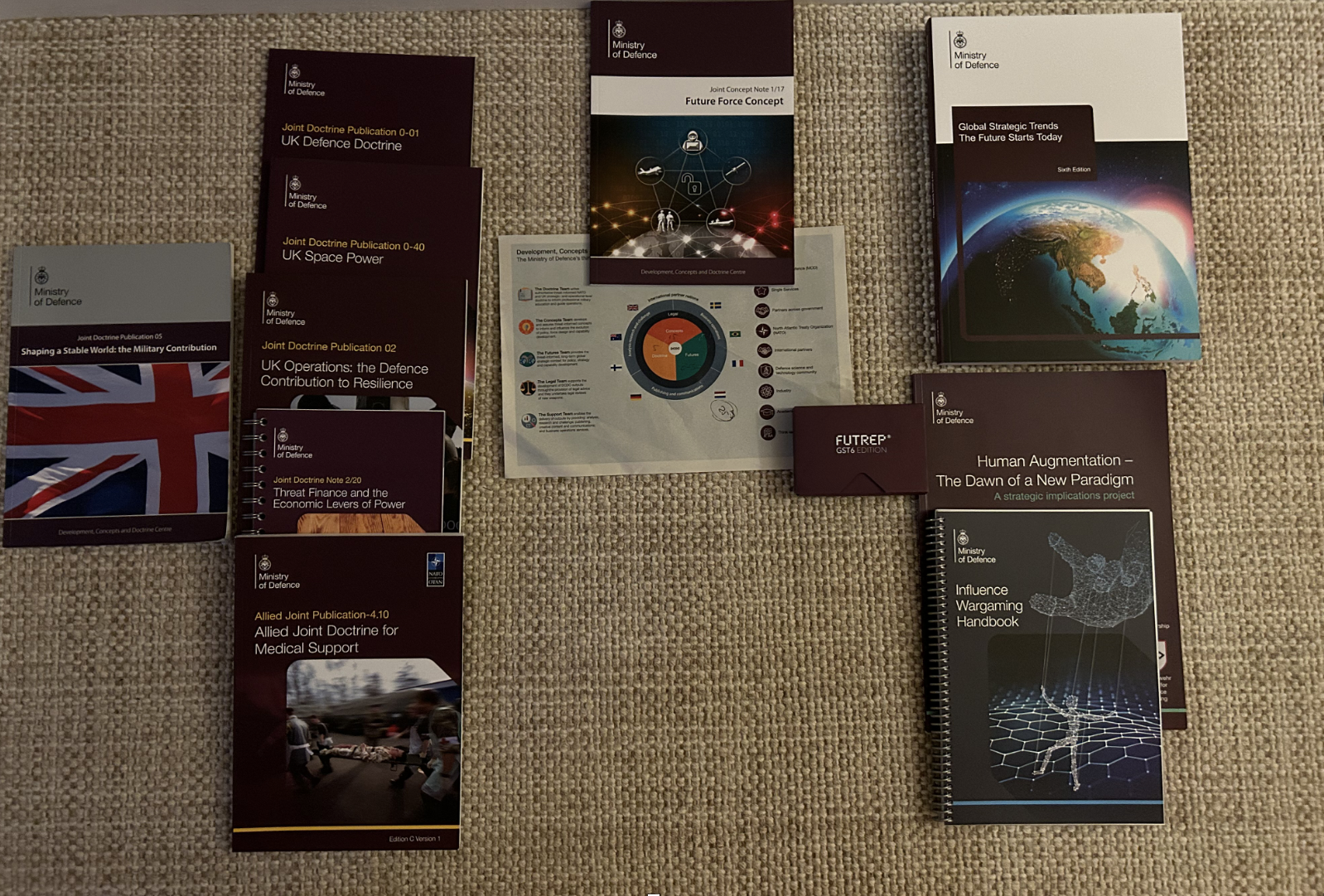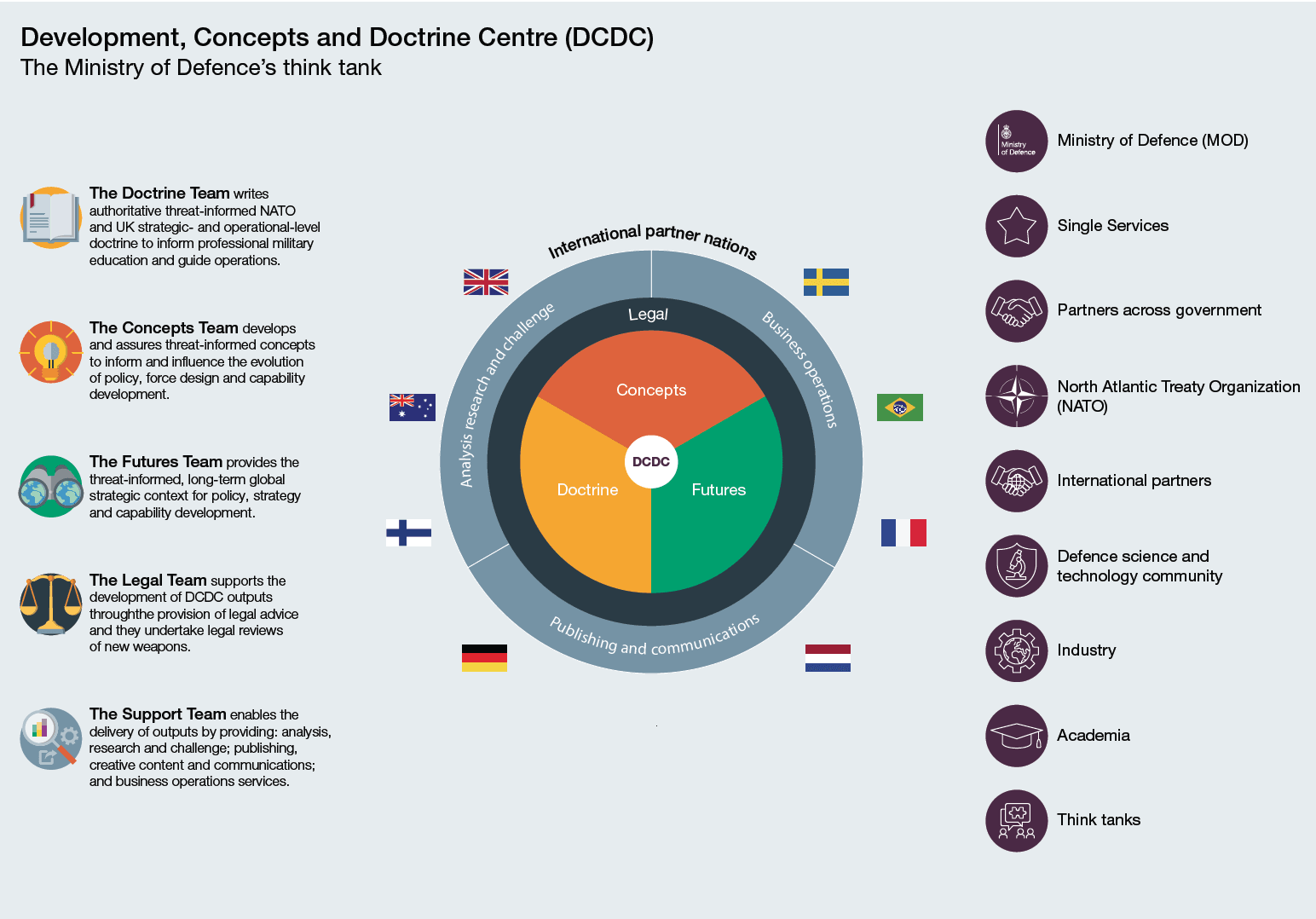For anyone who has studied the history of foresight, new developments often generate from within the defence and security industries. Examples include Herman Kahn and the RAND Corporation on applying game theory or Leon Fuerth, former National Security Advisor to Vice President Al Gore, who coined the term forward engagement. It was therefore a highlight of 2023 to spend some time with the DCDC team in Oxfordshire.
What initially caught my eye was how the DCDC breaks down foresight into three separate components: futures, concepts and doctrine. It applies distinct time frames and goals to each component and keeps them separate (but connected). Each component is led by different staff and each lead passes outputs onto the next, taking ideas and breaking them down into actionable tools and plans.

I was impressed how the DCDC team built discipline into the foresight process and to the extent that they sought collaboration from a diverse range of experts and nation states. They work hard to be flexible and informed in order to navigate uncertain times. I hope to continue to build on our initial meetings in 2023. Many of their publications can be found on their website here. The purpose and processes of the DCDC are summarised below.
Mission and Vision
The DCDC mission is ‘to challenge the status quo, inspire debate, and to provide world-class futures, concepts, doctrine and legal products. This is achieved through producing strategic foresight, concepts and doctrine, underpinned by evidence-based research and experimentation’.
The DCDC works to support Defence policy and strategy formulation whilst developing strategic and leadership skills and education. It was created ‘as a result of the 1998 Strategic Defence Review which took the view that Defence needed a clear long-term, truly joint vision of how our Armed Forces should operate’.[1] The DCDC assists Defence strategy, capability development and operations and provides the foundation for Defence education in the UK.[2] It aims:
-
-
- To be a leader in innovative and respected Defence thinking.
- To produce outputs that inform Defence strategy, capability development and operational activity.[3]
-
DCDC teams
The Futures Team focuses on the long term (next 30+ years), working with the DCDC’s global network to map what the future may look like. These ideas then flow into the work of the Concepts and Doctrine teams.
These findings and ideas are published as part of the DCDC’s Strategic Trends Programme, which has two main publications: Global Strategic Trends (which examines what may shape the future in the next 30+ years) and Future Operating Environment (which informs UK Defence and security policy-makers of potential operating environments over the long term).
The Doctrine Team focuses on the short term, using information from the Concepts and Futures Teams to turn thoughts and ideas about the future into doctrine for the present.
The Doctrine Team writes and maintains a range of operational-level UK and NATO doctrine publications, including thematic, functional and environmental doctrine. Working with UK Government experts, as well as international organisations such as the UN and NATO, this team seeks to maximise coherence and coordination with the UK’s closest allies and partners, and as much as possible, adopts NATO doctrine.
The Global Strategic Trends publication
One of the key outputs of the Futures Team is the Global Strategic Trends publication. The sixth and most recent version was published in 2018 and can be found on the UK Govt website:
Global Strategic Trends – The Future Starts Today (6th Edition) (GST 6) seeks to improve foresight and encourage better strategic choices to shape the future we want, build preparedness for alternative futures, and create an organisation that can adapt to the evolving future. It aims to alert readers to changes that are likely to become threats but may, if addressed promptly, provide opportunities.
GST 6 also identifies 16 focus areas where the potential for profound change to humanity is high, and describes a series of short alternative future scenarios.
GST 6 describes a future strategic context for those in the Ministry of Defence, and wider government, who are involved in developing long-term plans, strategies, policies and capabilities. Without a context, there is a risk that planners, policymakers and capability developers may assume a future that adheres to preconceived thoughts and assumptions. GST 6 describes the characteristics of a world 30 years from now.[4]
Key lessons for New Zealand from the DCDC

The DCDC is unique in that it looks at possible futures, then applies those to concepts about where the UK’s (and its allies and partners’) Defence programmes are going, before turning ideas into doctrine.
This DCDC model (illustrated below) shows this interrelationship between futures, concepts and doctrine. It demonstrates how the DCDC structures its research around clear timeframes, moving from long-term futures, to medium-term concepts, to short-term doctrine.
Having teams who work independently yet also collaborate to produce research and publications focusing on different time frames is immensely useful (see left for examples of selected publications).

Thank you to Director of DCDC, Air Vice-Marshal Fin Monahan, Ms Melanie Robinson (DCDC-Futures 6 SO1) and Major H.J. Russell-Blackburn for your time and generosity. Your publications now form part of the Institute’s library. I also appreciated your interest in our work, in particular our Government Department Strategy (GDS Index). Thank you.
Endnotes
[1] United Kingdom Government. (n.d.). Development, Concepts and Doctrine Centre. Retrieved 24 November 2023 from https://www.gov.uk/government/groups/development-concepts-and-doctrine-centre
[2] Ministry of Defence (UK). (2016). Development, Concepts and Doctrine Centre. Retrieved 22 November 2023 from https://assets.publishing.service.gov.uk/government/uploads/system/uploads/attachment_data/file/507544/20160217_DCDC_Pamphlet_Web__2_.pdf
[3] Ministry of Defence (UK). (2016). Development, Concepts and Doctrine Centre. Retrieved 22 November 2023 from https://assets.publishing.service.gov.uk/government/uploads/system/uploads/attachment_data/file/507544/20160217_DCDC_Pamphlet_Web__2_.pdf
[4] UK Ministry of Defence (2018). Global Strategic Trends – The Future Starts Today. Retrieved 23 November 2023 from https://assets.publishing.service.gov.uk/media/62828be5e90e071f69f22596/GST_the_future_starts_today.pdf
